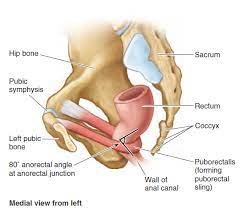How Does the Pelvic Floor Affect Bowel Health?
Yes, Your pelvic floor can be messing with your bowel movements!
While it’s something people often don’t like to talk about, pooping is an important and healthy part of life. Whether having a bowel movement is painful and/or infrequent, we’re usually only met with advice to eat more fiber, drink more water, and eat more vegetables. While these tips are important for a healthy system in general, it is not the whole picture.
It is often overlooked that having a bowel movement is a functional process, meaning things have to be able to move and contract in order to move waste through the colon to be eliminated. When waste is ready to be eliminated, the pelvic floor muscles have to be able to relax.
The muscles around the anus and the rectum itself have sensors that tell you when you have to produce a bowel movement. These sphincter muscles are then supposed to voluntarily contract to maintain continence so that you are able to make it to the bathroom, but are meant to fully relax on cue in order to eliminate.
If these sensors are not as “sharp” as they need to be, it can either give you too many signals that you have to void, leading to fecal urgency and often incontinence, or it can decrease the urge all together and lead to constipation.
One other common dysfunction we see associated with constipation is called “paradoxical contraction” of the pelvic floor muscles, meaning the muscles are contracting when they should be relaxing, and at least contributing to constipation. As you can see in the picture below, one of the pelvic floor muscles (puborectalis) acts as a sling and wraps around the rectum. When we are ready to have a bowel movement, this muscle specifically and the sphincter muscles in the anus relax to let the waste pass through. If these muscles are contracting when things are trying to pass through, it can lead to difficult and painful bowel movements.
As Pelvic PT’s, we work to improve the coordination of the muscles and your ability to control the muscles of the pelvic floor during a bowel movement. At Absolute Kinetics, we also perform advanced techniques such as visceral manipulation, to work on other restrictions within the intestines and other organs as well that can influence their motility.
If you’ve been dealing with constipation or fecal incontinence and have only been given medications as a solution, reach out to info@absolutekineticspt.com to learn more about how we can help you!
Blog post written by Dr. Tyler Kornblum, PT, DPT

